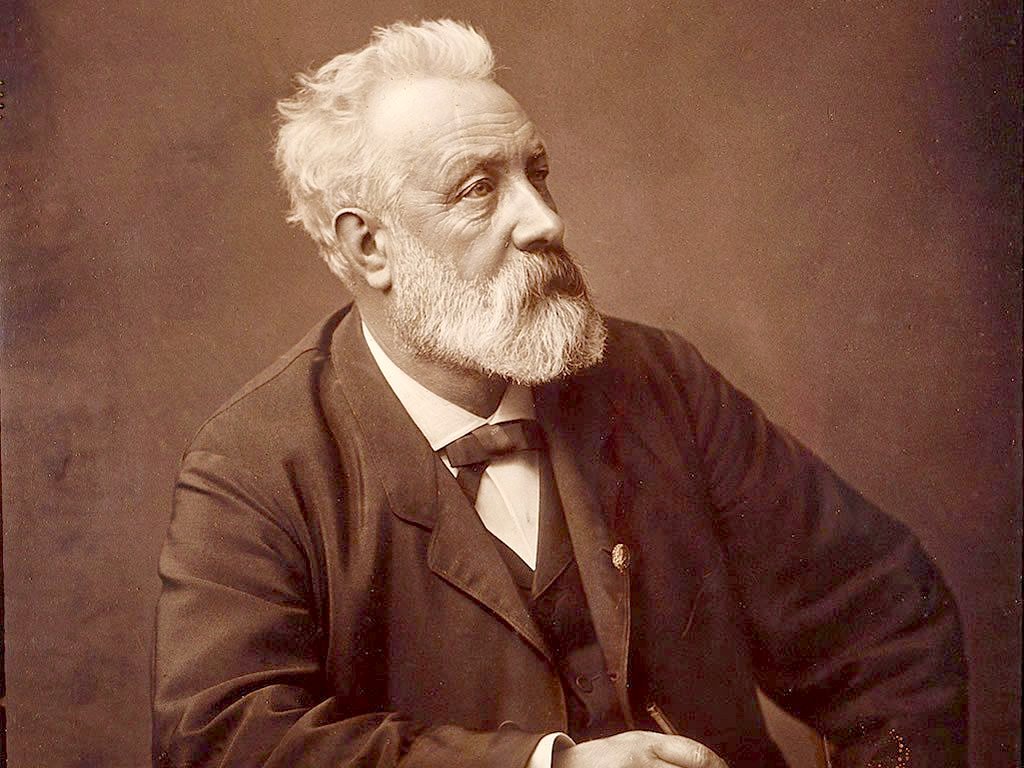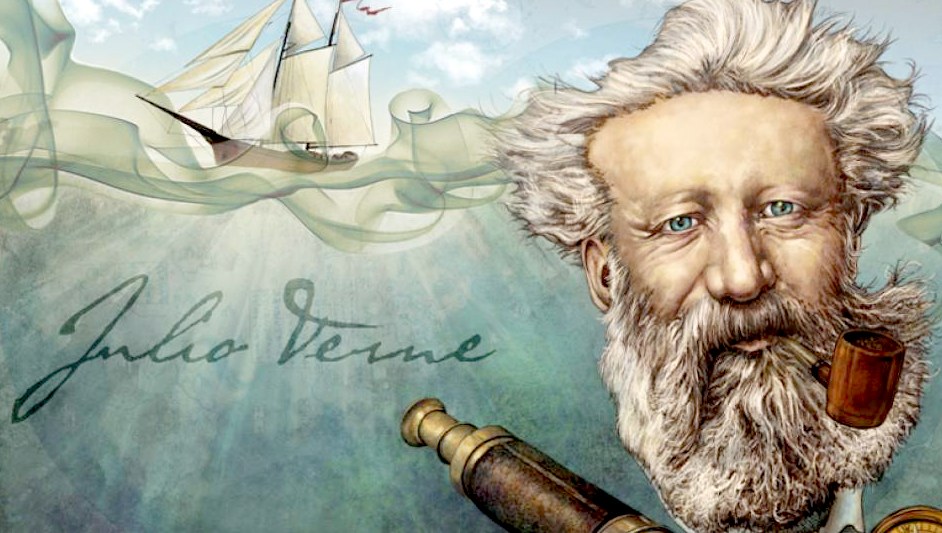|

What
a wonderful imagination the French writer had. He was also a practical
mariner, gaining much of his material from his travels, just like Herman
Melville, for his Moby
Dick. Jules Verne is best known for '20,000
Leagues Under the Sea' and Around
The World In Eighty Days. But he also authored a number of other
popular novels, that made it onto the big screen, such as 'The
Mysterious Island,' and 'Journey To The Centre Of The World.'
WRITINGS
WELL RECEIVED
After his debut under Hetzel, Verne was enthusiastically received in France by writers and scientists alike, with George Sand and Théophile Gautier among his earliest admirers. Several notable contemporary figures, from the geographer Vivien de Saint-Martin to the critic Jules Claretie, spoke highly of Verne and his works in critical and biographical notes.
However, Verne's growing popularity among readers and playgoers (due especially to the highly successful stage version of Around the World in Eighty Days) led to a gradual change in his literary reputation. As the novels and stage productions continued to sell, many contemporary critics felt that Verne's status as a commercially popular author meant he could only be seen as a mere genre-based storyteller, rather than a serious author worthy of academic study.
This denial of formal literary status took various forms, including dismissive criticism by such writers as Émile Zola and the lack of Verne's nomination for membership in the Académie Française, and was recognized by Verne himself, who said in a late interview: "The great regret of my life is that I have never taken any place in French literature." To Verne, who considered himself "a man of letters and an artist, living in the pursuit of the ideal", this critical dismissal on the basis of literary ideology could only be seen as the ultimate snub.
This bifurcation of Verne as a popular genre writer but a critical persona non grata continued after his death, with early biographies (including one by Verne's own niece, Marguerite Allotte de la Fuÿe) focusing on error-filled and embroidered hagiography of Verne as a popular figure rather than on Verne's actual working methods or his output. Meanwhile, sales of Verne's novels in their original unabridged versions dropped markedly even in Verne's home country, with abridged versions aimed directly at children taking their place.
However, the decades after Verne's death also saw the rise in France of the "Jules Verne cult", a steadily growing group of scholars and young writers who took Verne's works seriously as literature and willingly noted his influence on their own pioneering works. Some of the cult founded the Société Jules Verne, the first academic society for Verne scholars; many others became highly respected avant garde and surrealist literary figures in their own right. Their praise and analyses, emphasizing Verne's stylistic innovations and enduring literary themes, proved highly influential for literary studies to come.
In the 1960s and 1970s, thanks in large part to a sustained wave of serious literary study from well-known French scholars and writers, Verne's reputation skyrocketed in France. Roland Barthes' seminal essay Nautilus et Bateau Ivre (The Nautilus and the Drunken Boat) was influential in its exegesis of the Voyages extraordinares as a purely literary text, while book-length studies by such figures as Marcel Moré and Jean Chesneaux considered Verne from a multitude of thematic vantage points.
French literary journals devoted entire issues to Verne and his work, with essays by such imposing literary figures as Michel Butor, Georges Borgeaud, Marcel Brion, Pierre Versins, Michel Foucault, René Barjavel, Marcel Lecomte, Francis Lacassin, and Michel Serres; meanwhile, Verne's entire published opus returned to print, with unabridged and illustrated editions of his works printed by Livre de Poche and Éditions Rencontre. The wave reached its climax in Verne's sesquicentennial year 1978, when he was made the subject of an academic colloquium at the Centre culturel international de Cerisy-la-Salle, and Journey to the Center of the Earth was accepted for the French university system's agrégation reading list. Since these events, Verne has been consistently recognized in Europe as a legitimate member of the French literary canon, with academic studies and new publications steadily continuing.
Verne's reputation in English-speaking countries has been considerably slower in changing. Throughout the 20th century, most anglophone scholars dismissed Verne as a genre writer for children and a naïve proponent of science and technology (despite strong evidence to the contrary on both counts), thus finding him more interesting as a technological "prophet" or as a subject of comparison to English-language writers such as Edgar Allan Poe and
H. G. Wells than as a topic of literary study in his own right. This narrow view of Verne has undoubtedly been influenced by the poor-quality English translations and very loosely adapted Hollywood film versions through which most American and British readers have discovered Verne. However, since the mid-1980s a considerable number of serious English-language studies and translations have appeared, suggesting that a rehabilitation of Verne's anglophone reputation may currently be underway.
THE
FATHER OF SCIENCE FICTION
Jules Verne
hit his stride as a writer after meeting publisher Pierre-Jules Hetzel, who nurtured many of the works that would comprise the author's Voyages
Extraordinaires.
In all, Verne authored more than 60 books (most notably the 54 novels comprising the Voyages
Extraordinaires), as well as dozens of plays, short stories and librettos. He conjured hundreds of memorable characters and imagined countless innovations years before their time, including the
submarine, space travel, terrestrial flight and deep-sea exploration.

CLASSIC
WORKS - Jules Verne is best known for 20,000 leagues Under the Sea and
Around the World in Eighty Days, both of which became Hollywood
classics. Jules Verne was and still remains one of the best-renowned science fiction authors. His books were decades and even centuries ahead of their time, and while the initial reception to some of his books may have been muted they have nevertheless continued to amaze many as well as influence scientific discourse and debates. He remains unparalleled when it comes to science fiction and here are some of his top books.
Jules
Verne was the author of many adventure stories:
1
Twenty Thousand Leagues Under the Sea
2 Around the World in Eighty Days
3 Journey to the Center of the Earth
4 The Mysterious Island (Extraordinary Voyages #12)
5 From the Earth to the Moon
6 Michael Strogoff (Extraordinary Voyages, #14)
7 In Search of the
Castaways; or the Children of Captain Grant (Extraordinary Voyages, #5)
8 Five Weeks in a Balloon
9
Round the Moon (Extraordinary Voyages, #7)
10 Adrift in the
Pacific: Two Years Holiday (Extraordinary Voyages, #32)
11 The Master of the World (Extraordinary Voyages, #53)
12 The Adventures of Captain Hatteras
13 Les Tribulations d'un Chinois en Chine;
The Tribulations of a Chinese in China (Extraordinary Voyages, #19)
14 The Lighthouse at the End of the World
15 Mathias Sandorf (Extraordinary Voyages, #27)
16 Off On A Comet (Extraordinary Voyages, #15)
17 Los quinientos millones de la Begún (The five hundred million of the
Begún)
18 Facing the Flag (Extraordinary Voyages, #42)
19 Un capitán de quince años (A fifteen year old captain)
20 El Testamento de un excentrico (The Testament of an eccentric)
Many
people have used the eighty day target set by Jules Verne as the
goalposts for their technology projects having been inspired by the
famous French author. We are likewise enthused.
|

